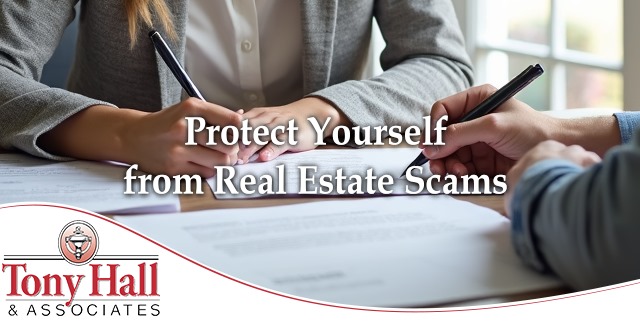Protect Yourself from Real Estate Scams in NC
Common Real Estate Scams to Avoid in NC
If you’ve been in the market to buy or sell a home in North Carolina lately, you’ve probably noticed just how fast things move. Homes get multiple offers within hours, paperwork flies through inboxes, and everything feels like it’s happening at lightning speed. That’s exactly the kind of environment scammers love. They count on distraction, urgency, and trust to sneak in and take advantage of people. And honestly, it happens more often than most realize.
1. The Fake Listing Scheme
This one’s sneaky. Someone copies photos and details from a real home listing and reposts it on another site — usually with a price that’s too good to be true. The scammer poses as the “owner” and asks for a deposit or first month’s rent to hold the property. You send the money, then find out the real property isn’t even for sale or rent. It’s a classic bait-and-switch that hits renters and buyers alike.
Always double-check listings on verified MLS platforms or with a licensed agent. If you’re dealing with a private seller, never send money before seeing the property in person and confirming ownership through public records.
2. Wire Fraud During Closing
Wire fraud is one of the biggest threats facing real estate transactions in North Carolina right now. It usually starts with an email that looks official — maybe from your attorney, title company, or even your agent. The message will say wiring instructions have “changed,” asking you to send closing funds to a new account. Once the money’s gone, it’s nearly impossible to recover.
The best way to protect yourself? Always verify wiring instructions in person or by calling the number you know belongs to your closing attorney or escrow officer. Don’t trust last-minute emails, no matter how legitimate they look.
3. Foreclosure Rescue Scams
When someone’s behind on their mortgage, stress can make them vulnerable. Scammers take advantage by offering “foreclosure rescue” or “loan modification” services that promise to save the home for a fee. They’ll ask you to pay upfront, sometimes even convincing homeowners to sign over property rights “temporarily.” It’s heartbreaking, and it’s completely illegal.
In North Carolina, legitimate foreclosure assistance should come through HUD-approved housing counselors, legal aid, or directly through your lender’s hardship programs — never through an unverified third party asking for money upfront.
4. Title and Deed Fraud
This scam is rare but devastating. Someone forges your identity to transfer ownership of your home into their name, then uses it to secure loans or sell the property. It’s more common with vacant land or second homes that sit empty. You might not even know it’s happened until you receive foreclosure notices or strange mail.
Regularly check your property’s title status through your county’s online registry of deeds. You can also consider title protection services or alerts that notify you if anyone files a document involving your property.
5. Investment and “Wholesale” Scams
There’s a growing trend of “investment opportunities” floating around real estate social media circles — people promising high returns if you invest in flipping properties or wholesaling deals. Some are legitimate, but others are thinly disguised Ponzi schemes. They rely on constant new money coming in, and when it dries up, everything collapses.
If an offer sounds too easy or the numbers don’t quite add up, step back. Verify the business license, ask for detailed financials, and talk to your attorney before signing anything. A real deal can withstand a little scrutiny.
6. Fake Realtor or Brokerage Impersonation
Scammers sometimes impersonate real agents or firms, using stolen headshots, license numbers, and social media profiles to look legitimate. They lure buyers into “exclusive” listings or ask for fees to secure off-market homes. It’s surprisingly easy for them to copy public data and create fake email addresses that look almost identical to the real thing.
Before sending any personal info or money, confirm the agent’s identity through the North Carolina Real Estate Commission’s license lookup. You can also contact the brokerage directly using the official website phone number — not one provided in an email or text.
How to Protect Yourself
- Use verified real estate agents and attorneys for every transaction.
- Be cautious about sharing personal or financial details over email or text.
- Watch for urgency tactics or “too good to be true” deals.
- Confirm wiring instructions in person or by phone before sending funds.
- Regularly review your property records online.
Working with a Trusted Local Expert
In a fast-moving market like North Carolina’s, trust and transparency matter more than ever. A licensed agent with deep local roots, like the team at Tony Hall & Associates, can help you navigate the process safely. They verify every listing, maintain direct communication with attorneys and lenders, and keep clients informed at every step. Basically, they make sure you never have to guess what’s real and what’s not.
Real estate is one of the biggest financial decisions you’ll ever make. Taking a few extra minutes to double-check details or verify an email can save you from a costly mistake. Scams thrive on urgency, so slowing down just a little is often your best protection.
And if something feels off — it probably is. Trust your instincts, get advice from a professional, and don’t be afraid to walk away. In the long run, being cautious beats being sorry every time.
About Tony Hall & Associates
Tony Hall & Associates has been helping clients buy and sell homes across North Carolina for over 15 years. Based in Raleigh, the team specializes in residential properties, investment opportunities, and navigating the local market with confidence. With a focus on transparency, integrity, and personalized service, Tony Hall & Associates ensures clients feel informed and supported at every step of the real estate process. Whether you’re a first-time buyer or seasoned investor, the team provides expert guidance to make your next property transaction smooth and secure.

